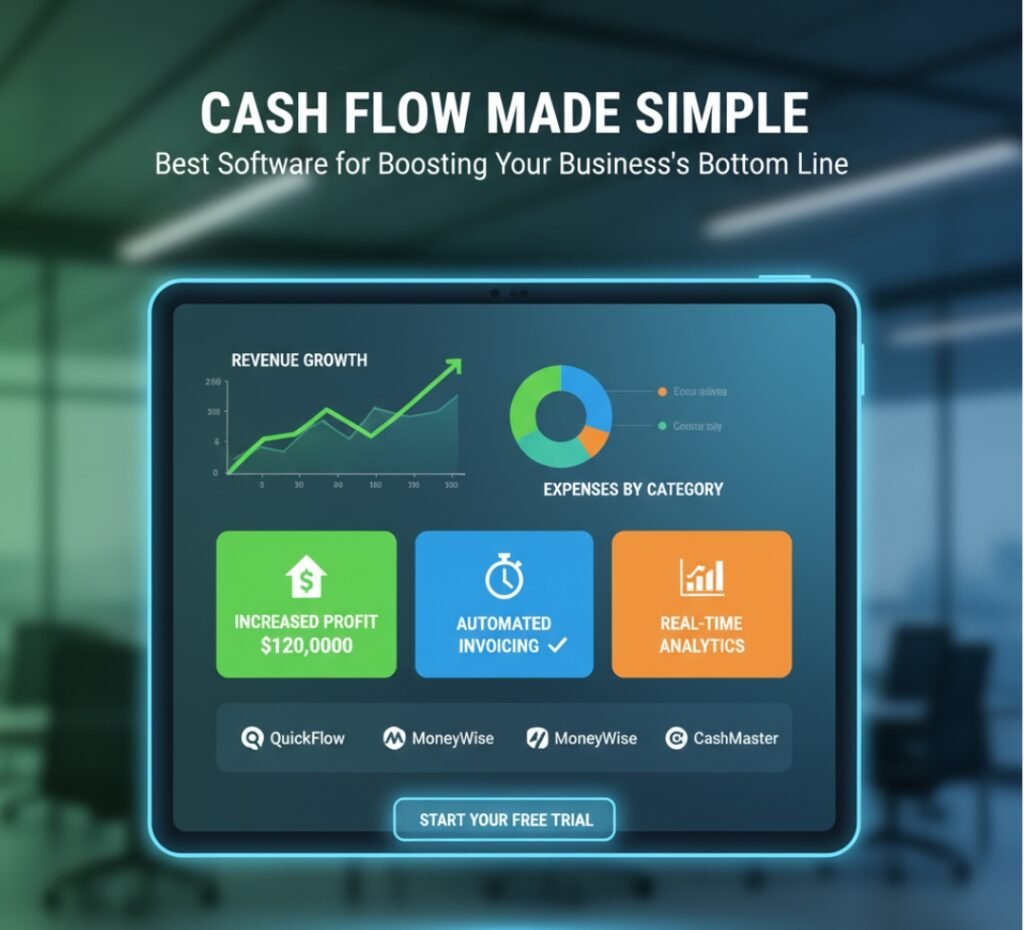For any business, cash flow is the lifeblood that keeps operations running smoothly. Without consistent inflows and careful management of outflows, even profitable companies can face financial strain. Thankfully, modern software solutions make managing cash flow easier and more efficient than ever. From invoicing tools to forecasting platforms, these resources help business owners stay ahead of challenges and identify opportunities to grow. Below are some of the best software tools to keep your cash flow strong and your business thriving.
1. QuickBooks Online for Comprehensive Accounting
QuickBooks Online is one of the most trusted accounting platforms for small to medium-sized businesses. It provides detailed cash flow insights, tracking everything from income and expenses to invoices and payments. Business owners can generate real-time financial reports to monitor liquidity and anticipate shortages. QuickBooks also integrates with banks and payment platforms, automatically syncing transactions for better accuracy. Its cash flow forecasting tool helps you project future balances, so you can make smarter decisions about expenses and investments.
2. FreshBooks for Hassle-Free Invoicing
Late payments are a common cause of cash flow issues, and FreshBooks helps solve this problem with streamlined invoicing features. The software allows you to send professional invoices, set up automatic reminders, and accept payments online. FreshBooks also tracks expenses and time, making it ideal for service-based businesses. With its mobile app, you can send invoices from anywhere, ensuring that billing happens promptly. By improving invoicing efficiency, FreshBooks helps you get paid faster and keeps cash flowing consistently.
3. Xero for Real-Time Collaboration
Xero is known for its user-friendly interface and collaborative features. It provides real-time cash flow updates, so you and your accountant or bookkeeper can monitor finances together. Xero’s dashboard highlights outstanding invoices, upcoming bills, and bank balances at a glance. The platform also integrates with third-party apps, from inventory systems to payroll tools, making it versatile for a wide range of industries. For business owners who want a clear, collaborative approach to financial management, Xero is a top contender.
4. Wave for Budget-Friendly Accounting
Wave is a free software option perfect for small businesses or startups keeping an eye on costs. Despite being free, it offers robust features such as invoicing, expense tracking, and basic financial reports. Wave makes it easy to send unlimited invoices and track payments, which is essential for maintaining healthy cash flow. Paid add-ons like payroll and payment processing are available if you need more functionality. Wave is an excellent option for entrepreneurs who want professional tools without a hefty price tag.
5. Float for Cash Flow Forecasting
While accounting software is great for tracking finances, Float takes cash flow forecasting to another level. By integrating with platforms like QuickBooks, Xero, and FreeAgent, Float helps you visualize future financial scenarios. You can create detailed “what-if” models to see how decisions—like hiring staff or investing in equipment—might impact your cash flow. This proactive approach ensures you can plan for growth while avoiding potential shortfalls. Float gives business owners the confidence to make strategic moves backed by data.
6. Bill.com for Payment Automation
Managing payables and receivables manually can slow down cash flow. Bill.com streamlines these processes by automating invoice approvals, vendor payments, and customer billing. It integrates with major accounting platforms, ensuring data stays consistent across systems. By speeding up both accounts payable and accounts receivable, Bill.com helps reduce delays and keeps money moving. For businesses with a high volume of transactions, this software is invaluable in maintaining liquidity.
📈 FAQ: Infographic Design for Business Owners
Cash flow management involves understanding complex financial data. For many business owners, translating that data into visuals makes it easier to interpret and communicate. Infographic design can turn numbers into engaging graphics that help with decision-making and presentations. Here are some frequently asked questions about using infographics for business growth:
Q1: Why should business owners use infographics for cash flow data?
Infographics make complicated financial information easy to digest. By simplifying data into visuals, you can quickly identify trends, share insights with your team, and make informed decisions.
Q2: What tools are best for creating infographics?
To start, it helps to have an infographic creator like the one provided by Adobe Express, which offers customizable templates. Other options include Venngage and Piktochart, which provide business-focused graphics for reports and presentations.
Q3: How can infographics improve internal communication?
Visuals allow teams to see cash flow strengths and weaknesses at a glance. Infographics can be shared during meetings, making financial discussions less intimidating and more collaborative.
Q4: Are infographics useful for external communication too?
Yes. Businesses often use them in investor reports, client updates, or marketing materials. A well-designed infographic can build trust by presenting data transparently and professionally.
Q5: Do infographics take a lot of time to create?
Not necessarily. With user-friendly platforms, you can design professional-quality infographics in minutes. The time investment is small compared to the clarity and impact they bring to your financial communications.
Managing cash flow effectively is essential for business stability and growth. Tools like QuickBooks, FreshBooks, and Float simplify everything from invoicing to forecasting, while Bill.com and Wave provide automation and affordability. Complementing these with infographic design ensures your data is not only tracked but also clearly communicated. By combining smart financial software with visual storytelling tools, business owners can keep their companies financially healthy while making confident decisions for the future.
Experienced SEO Specialist and Web Developer with a strong focus on off-page SEO and guest posting. With 3 years of proven expertise, I help businesses improve their search rankings and build sustainable online presence.
